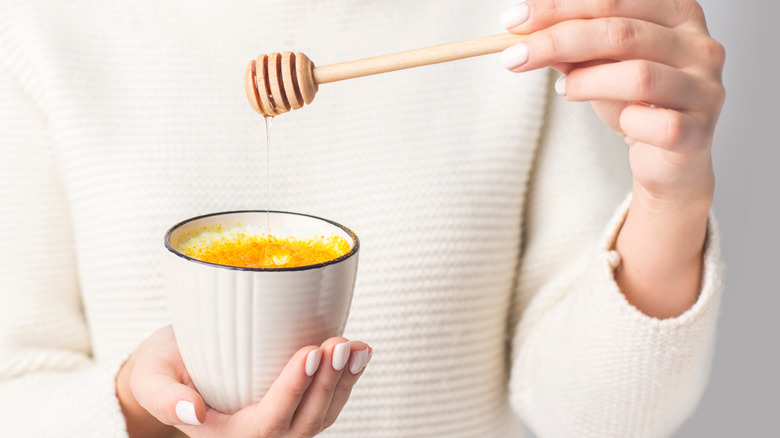Healthier Sweetener Options To Add To Your Diet, According To A Registered Dietitian
Artificial sweeteners are a popular way to cut down on the amount of sugar and calories you consume. While the Food and Drug Administration (FDA) has approved some sweeteners, such as saccharin, aspartame, sucralose, and stevia, they are not all the same. Fruit nectar and juice, honey, maple syrup, and molasses are considered natural sweeteners and are touted as healthier options (via Mayo Clinic). Artificial sweeteners are man-made substitutes, and have possible health concerns.
To help listeners navigate the sometimes confusing topic of healthier sweeteners, registered dietitian Shira Barlow, M.S., R.D, shares her thoughts about them on an episode of her "Good Instincts" podcast, which aired on December 7, 2022. One option she discusses is monk fruit. Barlow states that while it's natural and healthy, it can have a laxative effect and cause bloating in others, adding that it upsets her stomach. If it doesn't cause you any problems, and you want to use it, she recommends checking the label because it's often combined with sugar alcohols like erythritol, which can cause stomach upset.
Use any sweetener wisely
When it comes to choosing the best sweetener, Barlow says it comes down to what you're adding sweetness to. For coffee and tea, she states that she is a big fan of stevia because it doesn't impact blood sugar and is easier on the stomach. "But when it comes to baking and actual desserts and specific recipes, I, of course, think there's a time and place for real sugar," she notes. When you do decide to try to replace sugar, Barlow says to go with something less processed like maple syrup or honey when possible. However, she explains that maple syrup has a distinct flavor that doesn't work with everything. In addition, you will probably have to tweak a recipe if you decide to replace sugar with monk fruit or stevia because they are much sweeter than sugar.
Barlow stresses the importance of not overdoing it when it comes to natural sweeteners because they can "overstimulate" your taste buds over time, which can lead you to craving intensely sweet foods throughout the day. Harvard Health Publishing reports that in addition to this, people can even become addicted to artificial sweeteners, which can make natural, healthy foods seem unappealing.


